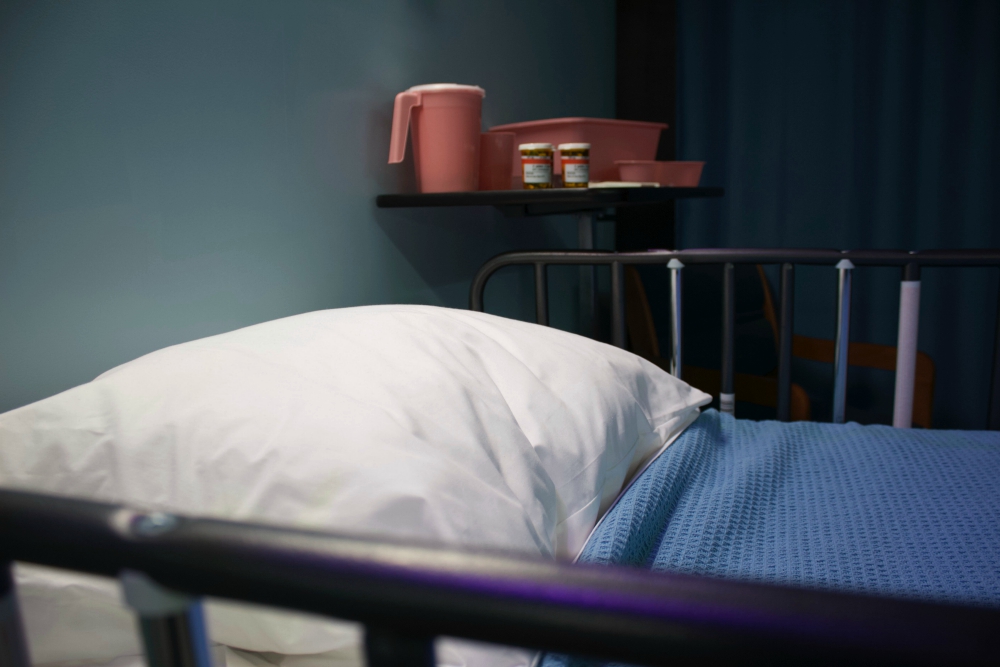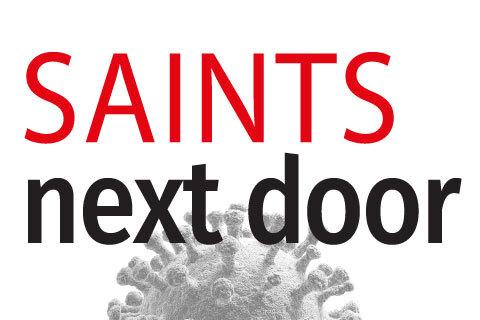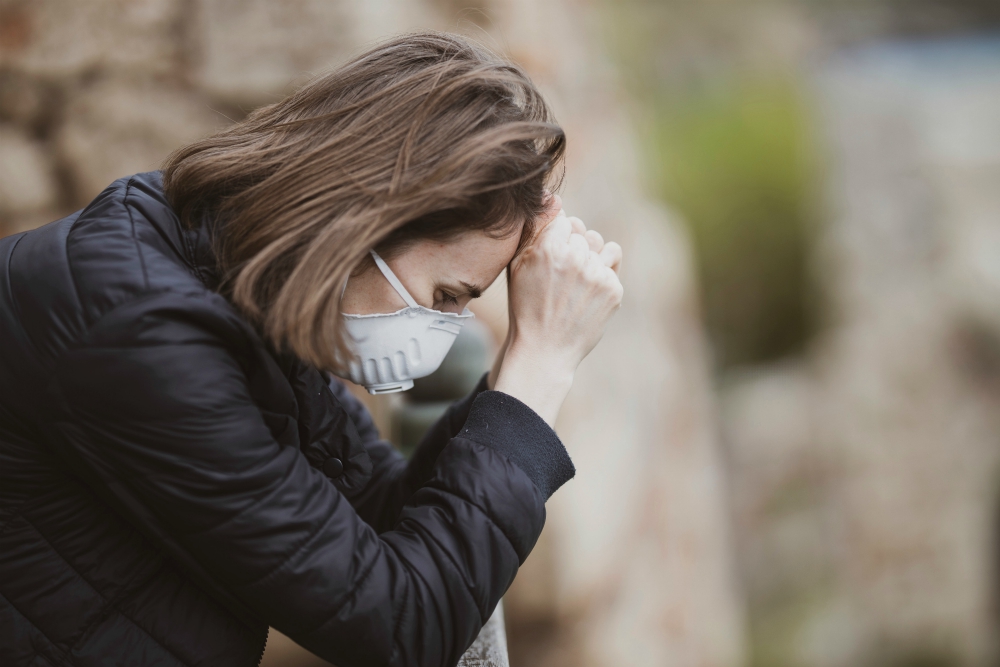
(Unsplash/Bret Kavanaugh)

Editor's note: On Holy Thursday, Pope Francis prayed for the dead as well as for the priests, doctors and nurses who he said represented the "saints next door" during the coronavirus pandemic. Over the next months, National Catholic Reporter and Global Sisters Report will be bringing the stories of Catholics in this crisis: those who have died, but also those whose service brings hope. To submit names of people for consideration for this series, please send a note to saintsnextdoor@ncronline.org.
As a hospital chaplain, I have cared for families who did not get the chance to say goodbye and those who did. And, in my experience, the difference in their grief is enormous. Saying goodbye begins the healing process. One family I cared for spoke to me about the nurse who held a phone to their dying father's ear as one by one, each of his adult children told him all that they needed to tell him before he passed from this life. While this family's grief was deep, I heard signs of hope and life in their voices as they expressed how valuable this nurse's witness was to them.
The families for whom a loss was unexpected tend to have a longer, harder road ahead of them as they seek meaning in their loved one's death. But hope for them is not lost; it's just going to be harder to find, particularly in the darkness of this pandemic. For these families, I invite goodbyes in the form of prayer or memory sharing. Speaking an audible "goodbye" into the silence is simple, but powerful.
This is one of many spiritual lessons I've learned as a hospital chaplain in the middle of a pandemic. Being a chaplain is already an intense, daily learning experience, but by mid-March of this year, it evolved into an education I'm not sure anyone could have imagined for themselves.
As a chaplain whose work during a global pandemic is now largely focused on grieving families and the hospital staff caring for COVID-19-positive patients, I have discovered, rediscovered and had affirmed an abundance of spiritual lessons that are worth sharing outside of the hospital.
For example, we all need ritual. As a lifelong catholic, I have always known this. My own spirituality has always been incarnational. I seek and find meaning in tangible expressions of my faith. But what I did not fully understand was just how much others rely on ritual without even realizing it, regardless of their faith traditions.
Many — if not most — of the rituals a chaplain can facilitate for grieving families are no longer available to us. Priests are unable to visit the hospital, much less anoint the sick. The family members who come to retrieve the belongings of their wives, husbands, fathers, mothers, sisters, brothers, cannot enter the rooms of their loved ones. Before the pandemic, I would invite families to make a sign of the cross on their loved one's hands and head. I would lead them in prayer around the body, with our hands joined.
Advertisement
These things are not lost to us. But they are inaccessible right now. But the need is still there, and so I've been personalizing prayers, typing them up and leaving them with patients or sending them to families who could not be present for my prayers said from behind the closed door of their beloved's room.
When I call grieving families from the hospital, I invite them to light candles at home, to gather over video chat or phone to pray together and to share memories, and to eat a meal in loving remembrance of their loved ones.
Prayer makes a difference. While the majority of the doctors, nurses and respiratory therapists I work with see the chaplain as involved in the whole-person care of patients, some are more resistant to my presence, particularly when it has involved praying over or into the ear of a sedated patient (who, some insist, can't hear me anyway).
Some of this resistance is due to nurses not wanting to expose themselves to the virus more than is already necessary. And I can totally empathize with that, so I try to coordinate my visits with when the nurse is going to be in a room already. But the lesson here for me has been how people understand prayer "works."
For me, prayer isn't a magic spell meant to heal a patient. It's not even a cheer meant to uplift a patient. Prayer is how we speak the love of God to one another. Ideally, I get to speak this love out loud, through a phone held up to the patient's ear. Sometimes, however, I have to pray outside of their room, which I do with extra conviction, imagining the prayers of my heart wafting into the room, surrounding the patient and resting on their hearts.
I witness the difference my prayer makes for the family of a patient, especially when I can tell them how I prayed, using their names and personal details. This prayer is a lifeline for them to their loved ones.
For patients, I let them shout. I sit with them while they clench their fists. I nod in agreement as they express the sheer injustice of it all. 'It sucks,' I affirm. 'It's unfair.'
I've also learned that laughter is a sign of healing and life. This virus is no joke. But we still need laughter for release, for how it reminds us that joy is not dead. Like rolls of toilet paper, it's just collecting in unexpected places and needs to be sought.
I learned this lesson directly from a patient who was recovering after having been on a ventilator for weeks. "I'm making jokes with my wife," he told me. For him (and for me), the laughter was a sign of normalcy. It did not negate the pain and suffering he and his wife had been enduring, but it reminded them that their lives still had joy.
Another lesson is that it's OK to get angry. Anger is a grief response. In fact, it is my primary grief response. These past few weeks, I've witnessed patients' families and health care staff in anger. But rather than distract them from it or tell them, "This, too, shall pass," a refrain that these female ears have heard many a male utter, I invite the people I care for to explore and express that anger. I document my anger for myself by writing about it.
For patients, I let them shout. I sit with them while they clench their fists. I nod in agreement as they express the sheer injustice of it all. "It sucks," I affirm. "It's unfair." Because it is unfair. And letting someone know in the middle of their anger that someday they won't be is not my pastoral style. I prefer to walk with the grieving in their anger and to accompany them as they figure out how to harness the power of that emotion for their own healing.
Liberation, feminist and womanist theologians have long been teaching the church of righteous anger. Anger points the way, they say. That anger is a sign of what you know in your soul is right and just. If you're angry, let it direct your heart and your spirit toward justice and the love of God.

(Unsplash/Engin Akyurt)
We really are in this together. I've heard this refrain a lot on my hospital shifts, especially from health care staff on the front lines in the fight against the novel coronavirus. They are witnessing real isolation, but know that, even for patients intubated and alone in a hospital room, it is by working together that they are able to care for and even heal these patients.
We may be isolated, but we can express to each other our gratitude, our love and our need for one another. I've experienced directly the effects of this in a hospital setting, where handmade signs from the community bedeck nurses' stations and break rooms. Chalk signs in the parking garage stairwell tell staff how much they are valued.
For anyone who hasn't seen the inside of a hospital the past few months, it might be hard to accept that social distancing is doing anything. I have sat with nurses and doctors and listened to their anxieties, their exhaustion, their frustrations. Intensive care unit nurses vigilantly monitor multiple patients at once because anything can happen in a single moment. They are worried about another surge because they are already maxed out.
Here in Illinois, social distancing has made a significant difference. It is the best way the general public has communicated to the hospital staff (of nurses, doctors, therapists, environmental services, security, chaplains, etc.) that our work on the front lines of this battle against the novel coronavirus matters.
Self-quarantining and social distancing are altruism at its finest. It is perhaps the most profound expression of love for the common good that I have witnessed in my lifetime. It involves sacrificing our personal wants for the good of the community.
This sacrifice has obvious Christian undertones for me, especially as our collective sacrifice is a matter of justice, particularly for the black and brown bodies disproportionately affected by COVID-19. By continuing to social distance, no matter what politically motivated leaders may say, we, as Christians, communicate that it is sacrificial love for one another that unifies us across the distance. The only way through is together.
[Meghan Murphy-Gill is a writer, editor and postulant to the priesthood in the Episcopal Church.]






